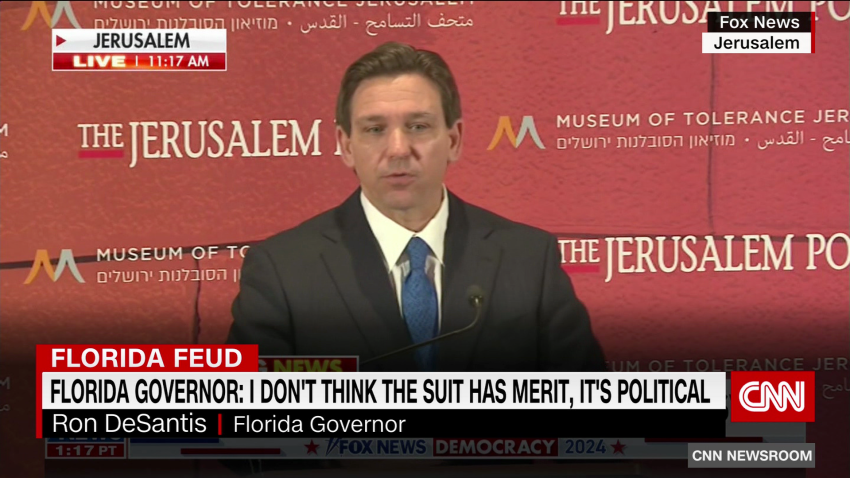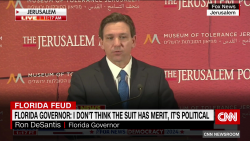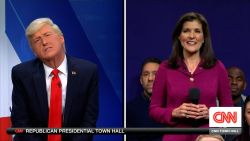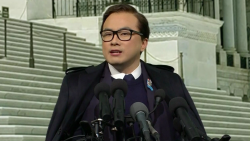Editor’s Note: A version of this article first appeared in the “Reliable Sources” newsletter. Sign up for the daily digest chronicling the evolving media landscape here.
“Hold off on the [Ron] DeSantis thing.”
That was the order from top Breitbart editor Matt Boyle in the company’s internal Slack channel last week, instructing staffers at the far-right outlet to pause stories on the Florida governor ahead of an expected 2024 run. Boyle, who described DeSantis as “inept,” signaled that stories related to the governor needed “sign off” from him, Editor-In-Chief Alex Marlow, and chief executive Larry Solov, according to screenshots of the conversation that I obtained.
The instruction from Boyle, the site’s notably pro-Trump editor, came after staffers had flagged a DeSantis commercial spoofing Dylan Mulvaney’s Bud Light video, which had generated a storm of anti-transgender backlash in conservative circles. The terse command led to suspicion inside Breitbart that Boyle, who had already confessed he viewed DeSantis negatively, was trying to wield his power at the outlet to tilt the scales against the Sunshine State governor and in favor of Trump in the lead up to the 2024 contest.
Boyle’s order, however, was met with fierce pushback.
Dylan Gwinn, a sports writer at Breitbart, told Boyle that he believed the DeSantis commercial was a sports story and questioned why he would need his authorization to post an article. “I need your permission to do a story on a hilarious ad?” Gwinn asked.
“To do a story on a political and likely candidate for president yes you do,” Boyle shot back. “It’s not a sports story, it’s a politics story.”
“Is this a new policy regarding all stories on all presidential candidates?” asked John Nolte, a senior Breitbart writer.
“You are to run anything on this by me,” Boyle sternly replied. “It’s not a new policy, it’s longstanding policy.”
The conversation grew even more heated.
“I’m unaware of this policy,” Nolte quipped. “I’ve literally written hundreds of stories on presidential candidates.”
“You are unhinged,” Gwinn added.
The tense back and forth inside Breitbart reflects a growing tension inside the right-wing media universe writ large — one that could have consequences for national politics. Ahead of the 2024 Republican primary contest, battle lines are starting to be drawn. On one side, supporters of Trump. On the other, supporters of DeSantis.
It’s reminicent of what took place in right-wing media during the 2016 GOP primary season. Back then, one camp of conservatives supported Trump, while others supported Texas Sen. Ted Cruz. This time, the early fault lines have been drawn between DeSantis and Trump.
Toward the end of the discussion, Boyle walked back some of his instruction, saying that the policy pertained specifically to stories about DeSantis and the Bud Light controversy— not everything under the sun about the Florida governor. In a statement, a Breitbart spokesperson told me, “Another day, another robust debate in the Breitbart virtual newsroom. Once again, Breitbart is the best place for GOP primary coverage, as CNN has always known.”
DeSantis’s campaign declined to comment.
But the manner in which the biggest mouthpieces in right-wing media cover the looming primary is highly consequential, and could ultimately decide who gets the party’s blessing. Republican primary voters primarily get their news from partisan outlets, such as Breitbart and Fox News, while shunning news from mainstream outlets.
Rupert Murdoch, the media mogul and Republican kingmaker who controls some of the most powerful organs in conservative media, appeared to make clear in the wake of the midterm elections that he would prefer to cast aside Trump in favor of DeSantis as the leader of the Republican party. That’s not to say that Fox News hosts like Sean Hannity will suddenly become anti-Trump, but the network has already worked to shower DeSantis in positive coverage, casting him as a crusader against radical “woke” ideology infecting the nation, and helping to boost his chances at taking on Trump.
But Murdoch’s power has limits, as was demonstrated in the 2016 Republican primaries. And a litany of anti-establishment, populist-leaning outlets and commentators — who continue to only grow in power — will likely remain in Trump’s corner. While the battles will be fought in headlines and hyperbolic critiques, the winner of this public struggle for the soul of the party could ultimately decide the direction of the nation.






















